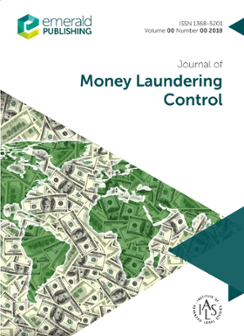Table of contents
A critical analysis of the anti-corruption policy of the federal executive council of Nigeria
Ehi Eric EsoimemeThis paper aims to examine the anti-corruption policy of the Federal Executive Council of Nigeria, to determine whether the policy is working and/or has produced unintended…
Financing of terrorism through the banking system
Fabian Maximilian Johannes TeichmannThe purpose of this paper is to illustrate that it remains feasible for terrorists to use the banking system to transfer funds to finance their activities.
Determining the nexus between financial inclusion and economic development in Pakistan
Muhammad Subtain Raza, Jun Tang, Sana Rubab, Xin WenThis paper aims to evaluate the relationship between financial inclusion and economic development in Pakistan based on available sources of detailed data and assess its outcome of…
The use of cryptocurrencies in the money laundering process
Chad Albrecht, Kristopher McKay Duffin, Steven Hawkins, Victor Manuel Morales RochaThis paper aims to analyze the money laundering process itself, how cryptocurrencies have been integrated into this process, and how regulatory and government bodies are…
Does corruption cause tax evasion? Evidence from an emerging economy
John Kwaku Amoh, Abdallah Ali-NakyeaThe purpose of this study is to examine the corruption-tax evasion nexus and to establish the strength of relationships among corrupting activities.
Saudi Arabia’s efforts on combating money laundering and terrorist financing: (Review undertaken in September 2017)
Mohammed Ahmad NaheemThis paper aims to study Saudi Arabia’s approach to combat money laundering and terrorist financing through legislation, regulation and implementation. Saudi Arabia is an integral…
The legal profession in Kenya and its anti-money laundering obligations or lack thereof
Constance GikonyoThe purpose of this paper is to examine the inclusion of lawyers in Kenya’s anti-money laundering regime and the role they can play towards assisting in detection and gate-keeping…
Predictors for compliance with anti-terrorist financing standards
Erik Joosten, Marion Bogers, Robert Beeres, Robert BertrandThe purpose of this paper is to identify and test predictors for countries to comply with the Financial Action Task Force’s (FATF) anti-money laundering and terrorist financing…
Exploring the role of risk and corruption on bank stability: evidence from Pakistan
Muhammad Ali, Amna Sohail, Lubna Khan, Chin-Hong PuahThis paper aims to explore the impact of liquidity risk, credit risk, funding risk and corruption on bank stability of the banking system in Pakistan.
Madoff’s dirty money
Linus WilsonThe purpose of this study is to estimate the profits to JPMorgan Chase from the Madoff Ponzi scheme’s checking account deposits at the bank based on the data in Harbeck (2011)…
Control of fraud on mobile money services in Ghana: an exploratory study
Isaac Akomea-Frimpong, Charles Andoh, Agnes Akomea-Frimpong, Yvonne Dwomoh-OkudzetoFraud is a global economic menace which threatens the survival of individuals, firms, industries and economies, and the mobile money service is no exception. This paper aims to…
Implementation evaluation: a future direction in money laundering investigation
Salwa Zolkaflil, Normah Omar, Sharifah Nazatul Faiza Syed Mustapha NazriMalaysia has implemented a comprehensive AML/CFT framework, yet its effectiveness remains questionable due to low number of prosecutions on money laundering cases. Therefore, this…
Rethinking the internal mechanism of the EGMONT group in financial crime control
Johnson Adeoye AdetunjiThis paper aims to evaluate the use of Intelligence gathering, especially the exercise of customer due diligence (CDD), enhanced due diligence (EDD), know your customer (KYC) and…
“Underground banking” and Myanmar’s changing hundi system
Rhys ThompsonThe purpose of this paper is to examine Myanmar’s “hundi” system, an informal value transfer system used widely by local Myanmar citizens and offshore migrant workers to remit…
Potential negative effects of a cashless society: Turning citizens into criminals and other economic dangers
Joseph Wilfrido RiveraIn the past few years, several countries have begun to drastically change their economies to be entirely cash free. The point of this policy change is to hopefully prevent the…
Politically exposed entities: how to tailor PEP requirements to PEP owned legal entities
Daniele CanestriThis paper aims to address the money laundering risk posed by politically exposed person’s (PEP’s) controlled legal entities. International standards and national legislation…
The impact of national culture on financial crime
Ahmed Yamen, Anas Al Qudah, Ahmed Badawi, Ahmed Bani-MustafaDespite the existence of laws, regulations and sanctions, financial crime remains widespread. The Panama leaks have proven that people from all over the world are participating in…
Illicit finance and money laundering trends in Eurasia
Stefan CassellaThe purpose of this paper is to review recent examples of sophisticated money laundering operations involving financial institutions in Eurasia, including Russia and Moldova, and…
Unearthing money laundering at Brazilian oil giant Petrobras
Lucas Maragno, José Alonso BorbaThis paper aims to provide an overview of key points pertaining to financial crimes taking place during the single largest fraud scandal in Brazilian history. The authors provide…

ISSN:
1368-5201Online date, start – end:
1997Copyright Holder:
Emerald Publishing LimitedOpen Access:
hybridEditors:
- Dr Li Hong Xing
- Prof Barry Rider